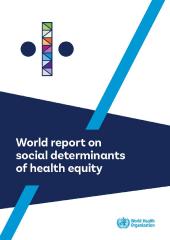Stay updated on what is trending in health. Discover tips and resources for a healthier, balanced life.
WHO's World report on social determinants of health equity
The WHO's 2025 World Report on Social Determinants of Health Equity highlights how factors like housing, education, and job opportunities influence health outcomes. It reveals that these social determinants can shorten life expectancy by decades, particularly in marginalized populations. The report calls for collective action to reduce health inequities, address discrimination, and invest in social infrastructure to promote health equity globally.
NEWS
Dr. S. Ali
5/9/20251 min read


The World Health Organization's (WHO) 2025 report on social determinants of health equity highlights how factors outside the health sector—such as housing, education, and job opportunities—are major contributors to health inequities. These inequities can significantly shorten life expectancy, with people in countries with the lowest life expectancy living 33 years fewer than those in countries with the highest life expectancy. Social determinants of health can impact health outcomes more than genetic factors or healthcare access.
The report stresses that health inequities are linked to social disadvantage, discrimination, and marginalization. For example, Indigenous Peoples face lower life expectancies compared to non-Indigenous people, regardless of the country’s income level. Health outcomes follow a social gradient, meaning people in poorer areas tend to have worse health and fewer healthy years to live.
While progress has been made, such as a 40% global decline in maternal mortality, the report reveals that health inequities are widening, especially in low- and middle-income countries. Children in poorer nations are 13 times more likely to die before age five than in wealthier nations, and maternal death rates are disproportionately high in disadvantaged groups.
To address these inequities, WHO advocates for reducing income inequality, structural discrimination, and addressing the effects of climate change, which is predicted to push millions into poverty. The report calls for collective action from governments, health leaders, academia, and civil society to invest in social infrastructure, promote health equity, and ensure that resources are allocated to the most local levels for maximum impact.
Full Report (PDF): https://iris.who.int/bitstream/handle/10665/381258/B09387-eng.pdf?sequence=1
.
Pulse Your Health
Empowering you to achieve your health goals.
Contact
© 2026. All rights reserved.
Disclaimer: The content on this website is for informational purposes only and is not medical advice. Always seek the advice of your physician or other suitably qualified healthcare professional for diagnosis, treatment and your health related needs.
